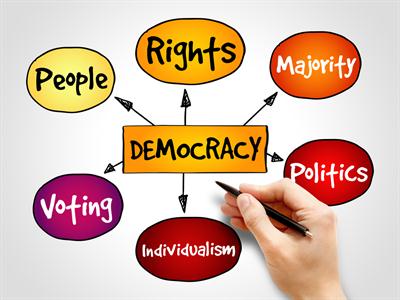
PUMPA - SMART LEARNING
எங்கள் ஆசிரியர்களுடன் 1-ஆன்-1 ஆலோசனை நேரத்தைப் பெறுங்கள். டாப்பர் ஆவதற்கு நாங்கள் பயிற்சி அளிப்போம்
Book Free DemoWhat is Democracy?
Democracy is a form of government that allows people to choose their rulers.
Only leaders elected by the people should rule the country. People have the freedom to express views, freedom to organise and freedom to protest.
Meaning of Democracy:
Democracy is a system of government in which the power is vested in the people of a country, and people elect their leaders either directly or indirectly through free and fair elections, which are usually held periodically.
Democracy is a system of government in which the power is vested in the people of a country, and people elect their leaders either directly or indirectly through free and fair elections, which are usually held periodically.
Important!
The term ‘democracy’ is derived from two Greek words: DEMOS meaning people and CRATIA meaning power. Thus, democracy means “the power of the people”.
Abraham Lincoln, one of the Presidents of USA, defines democracy as a government - of the people, by the people and for the people.

Salient features of Democracy
- Elected representatives of people. Final decision-making power to the representatives.
- Free and fair elections.
- People who have attained the age of 18 have voting rights.
- Fundamental rights and protection of individual freedom.
Evolution of Democracy
Democracy began 2,500\ years ago in some of the states of ancient Greece.
India also have evidence of democracy as early as the Vedic period. Chanakya’s Arthashastra tells us that in ancient India, a self-governing village community was the basic unit of the local government. During the later Chola period-ancient Tamil Nadu, the Kudavolai system was a very notable and unique feature of the village administration of the Cholas.
India also have evidence of democracy as early as the Vedic period. Chanakya’s Arthashastra tells us that in ancient India, a self-governing village community was the basic unit of the local government. During the later Chola period-ancient Tamil Nadu, the Kudavolai system was a very notable and unique feature of the village administration of the Cholas.
The evolution towards democracy is represented by the following values: Freedom, equality, fraternity, accountability, transparency and trust.